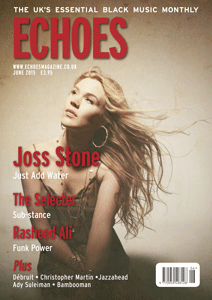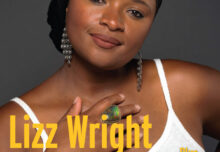JUNE 2015 ISSUE
A sneaky peek of just some of what is in the June 2015 issue!
Joss Stone
When a then 16-year-old Joss Stone launched her recording career back in 2003 with Soul Sessions, her famous covers album co-produced by Betty Wright and featuring a host of other Miami soul veterans as studio band, our reaction in this magazine was a fairly guarded, ‘Yeah, it’s nice, but let’s see what she’s doing in 10 years or so, when she finds herself’. Turns out, what Joss Stone is doing as she just clicks past 28 years on planet earth is… making reggae music.
Well, partly, anyway. Water For Your Soul, Joss’s seventh studio set, will be released on her own Stone’d label on July 17 and includes about half an album’s worth of music that leans in a reggae direction – much of it put together with the help of Damian Marley and our own Dennis Bovell. But it also encompasses a number of the artist’s other musical interests too: there’s soul, of course, and a little funk, and also various other intriguing textures picked up on her travels during the past couple of years…
Click here to buy and read more…
The Selector
Most youth movements inevitably appear dated after a while – the soundtrack included. What’s less likely to become frozen in time is the philosophy behind it. If the music actually stands for something, then it’s more likely to stay relevant.
2 Tone is a case in point. Forged in Britain’s industrial wastelands and draped in black and white, it was a cultural outpouring against a repressive right-wing government and a triumph for multiculturalism. It was music you could dance to and yet the lyrics often addressed more serious issues involving racial identity, police harassment, inequality and social decay…
Click here to buy and read more…
Rasheed Ali
The world of independently made and released soul music has a happy habit of taking us by surprise. It did it again a couple of weeks back when an out-of-the-blue message via Facebook from Rasheed Ali in Los Angeles alerted me to his very fine funk album/DVD 1968: Soul Power!
Available on iTunes and streamable online on his Youtube channel, it’s a veritable street party of a project that links 18 tracks of newly laid [but convincingly vintage sounding] JB and Curtis-style grooves to an equivalent number of videos which capture the essence of the late sixties and very early seventies for African Americans. It’s a remarkable and ambitious piece of work, pretty much put together by Rasheed on his own, and instantly tells us that we’re dealing with no ordinary musician here…
Click here to buy and read more…
Débruit
Xavier Thomas, a.k.a. Débruit, wears his influences on an increasingly broad sleeve. Back in 2010, on his Spatio Temporel EP, the track Nigeria What revealed a taste for chopped-up African house. Then there was 2013’s Aljawal, a joint project with Sudanese-born, US-based singer Alsarah. Both point to France-born Thomas’ latest album, Outside The Line, a project that follows songs like Afro Booty Musique on 2012’s From The Horizon to tap into sounds from Africa, except this time he’s also winding things back a few decades to the 1980s. Specifically to early 1980s New York, when downtown punks and new wave bands met uptown DJs and rappers.
Pairing murky retro synths with shards of African music old and new for Outside The Line, the album eerily cuts across continents and chronology in a cerebral manner that only Débruit, a self-described afrobeat surrealist, might imagine…
Click here to buy and read more…





